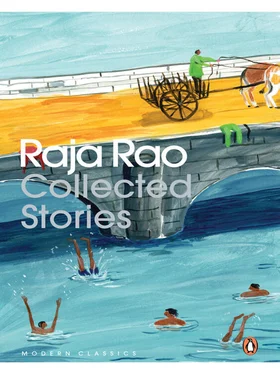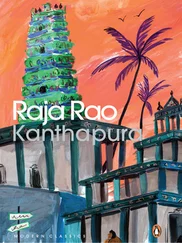Raja Rao - Collected Stories
Здесь есть возможность читать онлайн «Raja Rao - Collected Stories» весь текст электронной книги совершенно бесплатно (целиком полную версию без сокращений). В некоторых случаях можно слушать аудио, скачать через торрент в формате fb2 и присутствует краткое содержание. Год выпуска: 2014, Издательство: Penguin, Жанр: Классическая проза, на английском языке. Описание произведения, (предисловие) а так же отзывы посетителей доступны на портале библиотеки ЛибКат.
- Название:Collected Stories
- Автор:
- Издательство:Penguin
- Жанр:
- Год:2014
- ISBN:нет данных
- Рейтинг книги:5 / 5. Голосов: 1
-
Избранное:Добавить в избранное
- Отзывы:
-
Ваша оценка:
- 100
- 1
- 2
- 3
- 4
- 5
Collected Stories: краткое содержание, описание и аннотация
Предлагаем к чтению аннотацию, описание, краткое содержание или предисловие (зависит от того, что написал сам автор книги «Collected Stories»). Если вы не нашли необходимую информацию о книге — напишите в комментариях, мы постараемся отыскать её.
Collected Stories — читать онлайн бесплатно полную книгу (весь текст) целиком
Ниже представлен текст книги, разбитый по страницам. Система сохранения места последней прочитанной страницы, позволяет с удобством читать онлайн бесплатно книгу «Collected Stories», без необходимости каждый раз заново искать на чём Вы остановились. Поставьте закладку, и сможете в любой момент перейти на страницу, на которой закончили чтение.
Интервал:
Закладка:
But there comes Bhedia. She also loves licking Bhedia, when Bhedia stands before her. Sometimes for hours Bhedia and Jhaveri Bai have long conversations. Bhedia stands there, his beard like a rope, and his face full of fresh scars — for once in a while Mohone and Kishen would give him a fine thrashing. And this is when his prophesies do not always come true. Bhedia after all speaks for Heaven. And the earth does not always live up to his celestial visions. So much the worse for the world. And Bhedia never minds being beaten by children. It makes him feel fit. It makes him even happy. And when it is too painful he simply howls and all the elders come running, from the nearby building. They throw a coin at him, laugh and go away. What can you do with an idiot? Where is Mohone now? Gone? Gone? Gone.
One day Mohone and Kishen indeed disappeared. They never could take Putli with them. Perhaps someday we’ll hear of them as great stars. Who knows? But for Bhedia he lost two good friends. ‘Now, I only have you,’ says Bhedia to Jhaveri Bai. ‘You are the Mother, and you are the Father, you are the Prince and you the charioteer. Lick me Goddess for your saliva is as honey. In Benares all dust is musk, in Benares all tears are nectar, in Benares there are no slaves and no animals! For all creatures are free. The mighty Shiva in his greatness takes his leap, and he dances. Hé, Jhaveri Bai, if you were not like Mother to me I would say, “Marry me, for I have a horse.” A horse is no good for just a wife. But a horse is not bad you know. And he can flit from earth to Heaven within the wink of an eye. O Jhaveri Bai, can you sing? I can. Listen.
When Kanhia went to steal
And the mountains moved
Yasodha came from the kitchen and cried:
‘Hé, you mischief, you diamond’
And hung him to her breast.
Isn’t that a good song? Now, come, Jhaveri Bai, sing. The boys have gone. They will throw no stones at widows or tear my beard or bring me stolen sweets, will they? I have sent them to hell. They deserve to be great stars as I deserve to be a father. Am I a father? Am I not good enough Jhaveri Bai?’
Jhaveri Bai licks Bhedia with a love that would move men. She has such tears, she could bring the four black horses of his master, and give Bhedia back his master. What’s an angry shout? All rich people shout. They think shouting is good for their throats. Lord, the humble alone are made for God. The humble who ask not like Bhedia, who beg not. ‘We can bathe in the Ganga and be pure.’ At this Jhaveri Bai gently gets up on her hind legs, whisks away a few flies, and slowly ambles down the lane to the ghats. The flies have remained behind with Bhedia. His wounds were fresh, and he did not care. Was Mohone in Bombay now, you think?
When Jhaveri Bai descends the ghats one step by one step, you feel as though the mountain was coming to the river. Jhaveri Bai sniffs the air a little, and just like a human being, she slips between pilgrims — between shaven-widows, and young married women, their shyness covered with the Ganges and wet cloth — she eats, does Jhaveri Bai, a banana peel here and there, smells a torn and forgotten towel, but before anyone has said a thing, anything, she has moved on to try and swallow some fallen pilgrim flowers. Then Jhaveri Bai looks up at the heavens, and contemplating the vast ocean which is Mother Ganga, she the daughter of the Mountains, who carries so much burden of this heavy, heavy earth — Jhaveri Bai steps one leg into the water. The flowers still hang out of her mouth. O it is so cold. Then a second step down and a third and a fourth, and sprinkling her back and face with her tail, she goes deep in till only the neck remains. Jhaveri Bai contemplates now as if she were the flow of the Ganga (and her thoughts were not far from Bhedia or the Chettiar who had offered her to God) and after she has looked across the ghats, over the pyres and the palaces and Dufferin Bridge, she shivers as if she gave up her thoughts to Mother Ganga, and looks across the river to Ramnagar. Sri Rama once set his foot there on his way to fetch the great Mother Sita. Yes, the image of Him is Sweet. ‘Rama, Lord of the Cows,’ she says, ‘Sita Devi, mother of us, I worship you, that my sins, my friends’ sins, and all evils be taken away. Birth is so mean, Death is so low. Mother give us no birth or death.’
The cow’s tears are purer than your Brahmin prayers. Come and see it there, if you will, by the Benares ghat. ‘God you made the elephant and the peacock, the bear and the porcupine — even the dog did you make and the hyena, creatures of the earth. But the cow, Lord, you made as your first child. Lord, I sink in your waters, I sink into my origins, Lord give me the gift of truth.’
The Ganges flows fierce and fresh on Jhaveri Bai’s back. Head in-turned and her horns unshaking, Jhaveri Bai contemplates her own face in the moving waters. There’s magic in this picture that appears and disappears.
VI
Shankar could never speak. He could only shout. And you would hear him halfway up across the River at Ramnagar fort In any case he could not talk to you even if he wished to. He always had to speak to the uplifted sky. A husky high voice, a rough pockmarked face, thick glasses and many swear words that he had gathered from Hindi, Kannada, Tamil (his mother tongue), Marathi (his neigbour’s tongue) and even Gujarati because his father often had Gujarati clients who came to consult a horoscope, and, perchance invite him to a funeral feast when the Gujarati Brahmins were otherwise too busy, for Benares is a busy mart and many persons’ funeral anniversaries may fall under the very same star. And this again is a mystery which someday somebody may have to clarify to Benares Brahmins: Why on the same day so many more die than on another day according to the celestial calendar; say around April full-moon more than around the festivities of Dussehra. There are such laws, and the Brahmin has to accept this as one accepts the monsoon floods or the vivid summer heats. So many more in Gujarat and Maharashtra, in Mysore and in Peshawar have died — on exactly the same day, and on other days, the deaths are like cloud-wisps on pre-autumnal sky, you can count them, one, two, three, four, five, short, larger or elongated. To Shankar who studied mathematics at the university, and who knew some astrology, this was all a case of ‘cosmological equations’ as he learnedly called them. There is cosmology (which is based on geophysics) and astrology (which is based on pure numbers) and together you could make a happy mathematic and proclaim why the heavens desire (or order) the major number of deaths on one day, and such wretched few on others, so very discourteous to the Brahmins of Benares.
Our friend Madhobha (of the firewood shop) is one of Shankar’s friends. That is to say Shankar shouts, ‘Hé, Madho, what are you faking? Why don’t you come down and have a smoke?’ and Madhobha if he’s free at all will come out and stand by the gate, and talk of anything, especially of astrology. For Madhobha, however, his interest in astrology only started when he thought his Mohini was perhaps a wife of another life. Do such creatures exist? — one means by that, enticing subtle forms of women. He never confessed he saw a Mohini. No, Madhobha explained, he just asked because he’d heard, in his village, people speak of it. ‘What do I know, brother?’ Shankar would shout to the street, so that the boatmen landing passengers even could hear, despite the constant lapping of the Ganges waters. ‘The stars are there, high up there, my dear fellow, and man is here. Two there and two here make the same. Thus there’s intelligence between man and the star— through their common lingo: numbers. Hé, tell me, did you win in that bout with Abdullah? Somebody said Abdullah killed a tiger with a club when he was young. And you, you cannot even twist a cat’s ear with your big, big heart.’ ‘Oh, no,’ says Madhobha, ‘when I fight, I fight. You should one day come and see me in the ring?’ ‘Yes, I will,’ says Shankar.
Читать дальшеИнтервал:
Закладка:
Похожие книги на «Collected Stories»
Представляем Вашему вниманию похожие книги на «Collected Stories» списком для выбора. Мы отобрали схожую по названию и смыслу литературу в надежде предоставить читателям больше вариантов отыскать новые, интересные, ещё непрочитанные произведения.
Обсуждение, отзывы о книге «Collected Stories» и просто собственные мнения читателей. Оставьте ваши комментарии, напишите, что Вы думаете о произведении, его смысле или главных героях. Укажите что конкретно понравилось, а что нет, и почему Вы так считаете.












